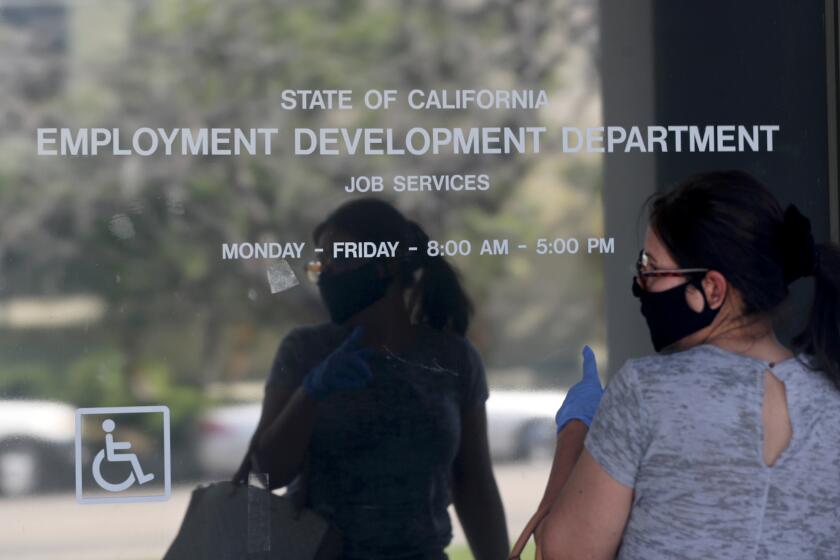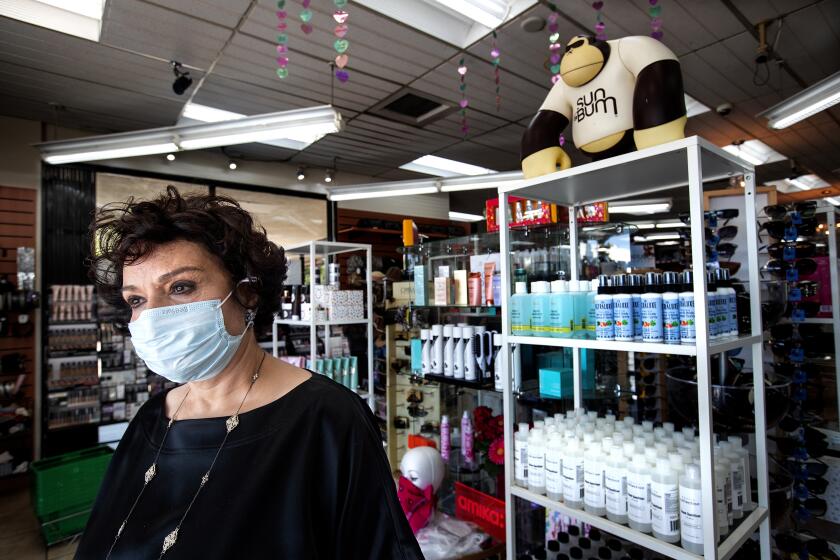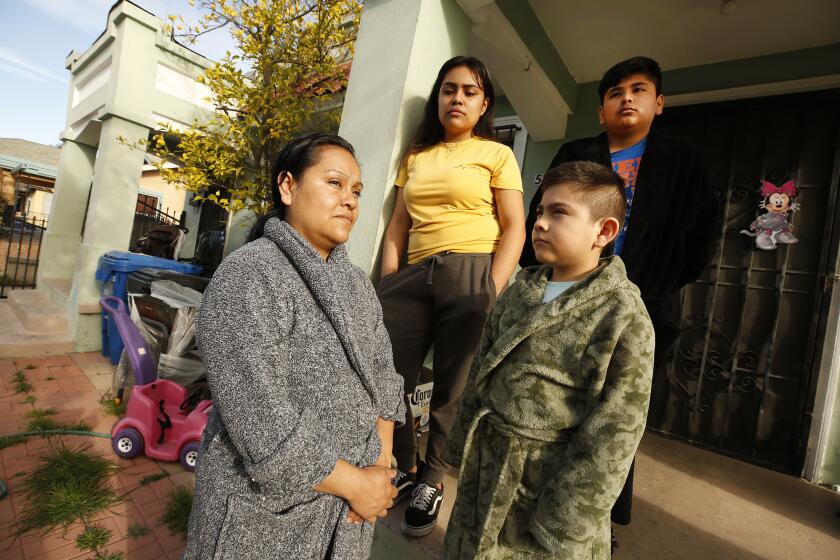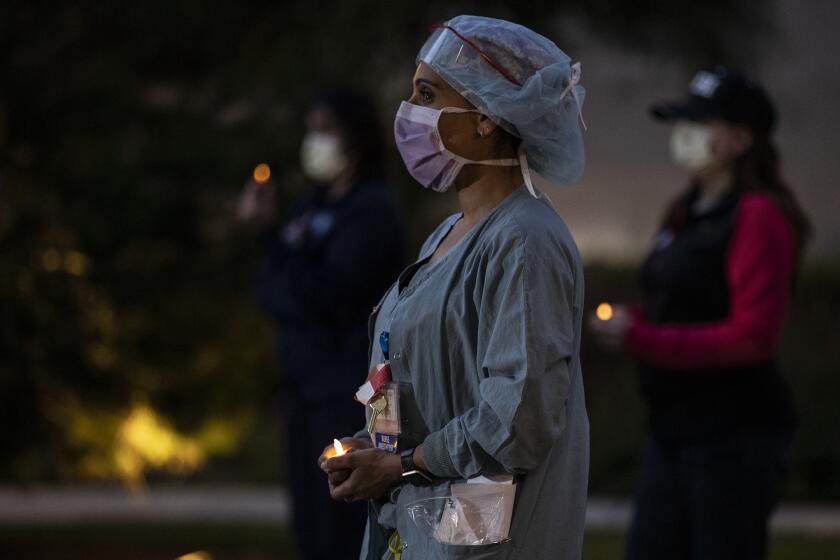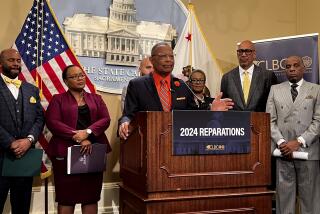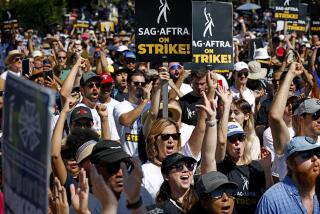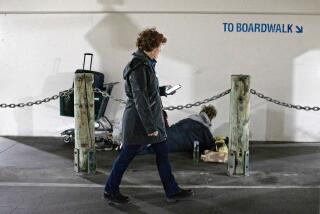There’s a black jobs crisis. Coronavirus is making it worse
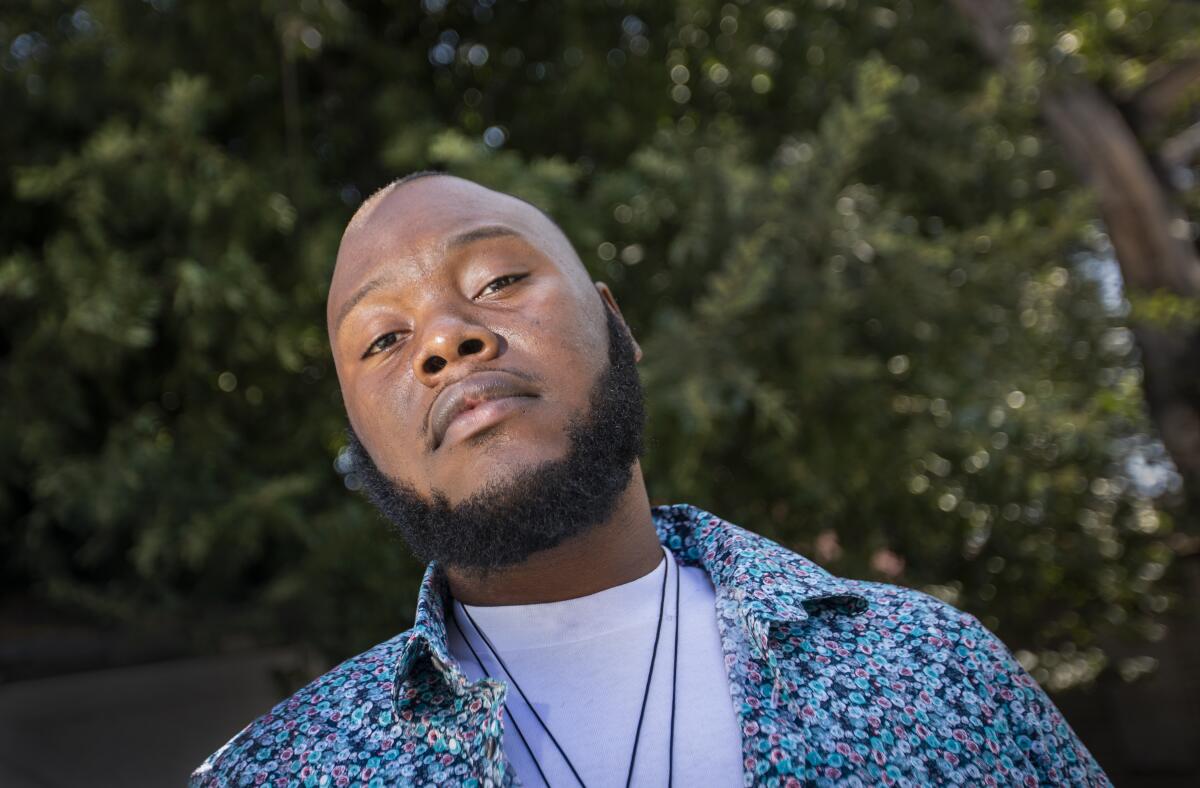
- Share via
After weeks of catastrophic job loss across the country, May’s labor report held out a glimmer of hope: The nation’s overall unemployment rate ticked down to 13.3%, from 14.2% in April.
But for black Americans it was more bad news: A staggering 16.8% of the African American labor force was out of work, up a notch from 16.7% in April.
In California and nationwide, the coronavirus shutdown is widening the racial divide between haves and have-nots. And the pandemic-driven economic meltdown has helped to inflame the black community’s deep sense of injustice as uprisings over police brutality spread across the country this week.
Minneapolis is some 1,500 miles from Los Angeles, but protests across California over the killing of yet another unarmed black man erupted with equal ferocity. Beneath the fury over George Floyd’s death lie longstanding economic inequities that have plagued the 2.6 million African Americans who account for 6.5% of California’s population.
“Nearly half the black community has had either no job or a poverty, dead-end job that doesn’t pay basic needs of housing and food,” said Lola Smallwood Cuevas, the founder of the Black Worker Center in South Los Angeles.
“The financial instability has been tearing at the social fabric of black communities,” she said. “It is fueling a lot of what we are seeing in this recent uprising. Many black residents have to stitch together two or three jobs to survive.”
Three years ago, Cuevas helped research a UCLA Labor Center study on conditions in Los Angeles’ black neighborhoods. African American workers with a high school degree or less were twice as likely to be unemployed as whites with the same education, the report found.
It highlighted the decline of stable, well-paid blue-collar jobs in Los Angeles’ black neighborhoods as industries moved to the suburbs, to Southern states with lower wages and fewer unions or to other nations. Between 1980 and 2014, the percentage of L.A. County’s black workers in manufacturing jobs shrank from 19% to 5%.
“As a result of widening inequality, rising housing costs, and a glaring lack of economic opportunities, Los Angeles is in the throes of a black jobs crisis,” the researchers wrote. The remaining jobs “declined in quality, and as black employment cratered, these communities — especially their men — were increasingly criminalized and ensnared in California’s historic expansion of incarceration.”
In 2017, the California Poverty Measure, which accounts for cost of living, found 17.6% of black Californians living in poverty, compared with 12.5% of white residents, 16.4% of Asians and Pacific Islanders and 23.6% of Latinos.
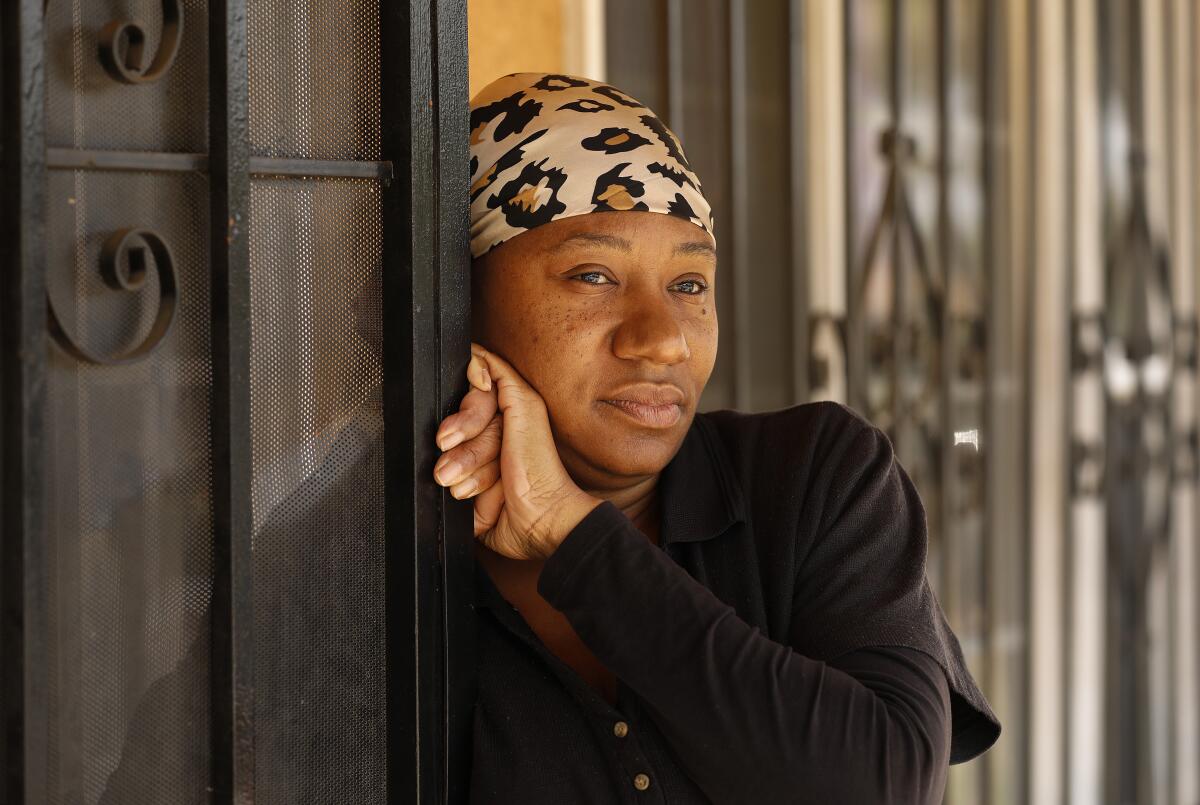
And now the coronavirus is disproportionately affecting California’s African Americans.
Since COVID-19 began claiming lives, black Americans have died at twice the rate of white ones. In Los Angeles County, African Americans have suffered 26 deaths per 100,000 residents, compared with 22 for Latinos, 16 for Asian Americans and 13 for whites.
“We’ve basically wiped out a decade worth of job creation in a month and a half,” an economist says. May’s unemployment figures will probably look even grimmer.
“At no time in recent history have deep racial disparities in well-being appeared as obvious as they do today,” the Public Policy Institute of California wrote in a post this week. Underlying health conditions, less access to medical care and insurance, and more exposure to the virus due to employment and housing conditions contributed to the higher toll of the pandemic on African Americans, researchers found.
State-level job data by race won’t be compiled for months, but an analysis of Californians’ unemployment benefit claims by the state Employment Development Department and the nonprofit California Policy Lab shows the virus’s unequal impact.
From mid-March to mid-May, more than a quarter of California’s black workers, along with more than a quarter of its Asian workers, filed jobless insurance claims. For whites and Latinos, the proportion was also dire but somewhat less so: 21%.
On March 23, Trusion Daniels was laid off from his $15-an-hour job as a cook for a KFC outlet at Los Angeles International Airport. It couldn’t have happened at a worse time. Before the pandemic, the 29-year-old had lined up a job in Las Vegas, where he planned to attend culinary school.
The coronavirus outbreak “threw a wrench in our whole plan,” he said.
He used his last paycheck to help his mother rent a U-Haul and pay for storage when her landlord sold the Hawthorne building where he lived with her and 13 other family members.
After a short hotel stay, the family moved to South Los Angeles, but Daniels “didn’t want to crowd up space,” he said, so he couch surfs at a friend’s. Unemployment benefits are cushioning the blow, although how long they will last has yet to be determined as Congress debates future relief.
Daniels is no stranger to violence. He recalls watching a video of a friend’s nephew who was shot by police as he lay on his stomach. “A lot of people are angry and scared,” he said. “I’m six-two. I’m a dark-skinned man. When I walk down the street, I’m on guard.”
L.A. is prosecuting more than 70 businesses so far for allegedly flouting COVID-19 rules. The group includes pet groomers, salons and smoke shops.
When he told his family he planned to attend the protests with his younger brother, his mother “was blowing my phone up,” Daniels said. “My grandma was blowing my phone up. They was, like, ‘Come back home.’”
Nationwide, median income for white households was $65,902 in 2018, compared with $41,511 for black households. In California, the gap was similar: $77,904 versus $53,565.
But unemployment and low wages are not the only measures of racial inequity. From 17th century slavery to 20th century redlining and housing discrimination, black residents have long been thwarted in accumulating wealth, so they have less to fall back on when a disaster such as the pandemic hits.
State-level data on assets by race are limited, but nationwide the cumulative effect of inequality and discrimination “can be traced back to this nation’s inception,” according to a February study by the Brookings Institution, which detailed how inherited wealth has buoyed white families over generations.
At $171,000, the net worth of a typical white family in 2016 was nearly 10 times that of a black family, at $17,150, the study reported. And during the Great Recession, median net worth declined more for black families (44.3%) than for white families (26.1%).
“The ratio of white family wealth to black family wealth is higher today than at the start of the century,” Brookings researchers wrote.
With COVID-19 killing African Americans at a higher rate than other races, attention is increasingly focused on the kinds of jobs they hold.
A hotel housekeeper, victim of a coronavirus layoff, struggles to support her three kids. ‘I just want to keep my little family together,’ she says.
A UC Berkeley Labor Center study last month analyzed the racial makeup of jobs that California officials designated as essential, including those in hospitals, home care, nursing homes, grocery stores, warehouses, meat processing plants, trucking and public transit agencies.
“Overall, Latinx workers have the highest rate of employment in these jobs (55%), followed by black workers (48%),” the report says. “As a result, both groups likely face greater risk of exposure to the coronavirus in the workplace than other race/ethnic groups.”
Among white workers, just 35% held jobs in industries labeled as essential, along with 37% of Asian workers.
Tina Jones, 43, a full-time medical claims examiner, works a second job on nights and weekends at a South Los Angeles supermarket cleaning carts and bagging groceries for $14.45 an hour.
Her store fails to enforce certain safety measures such as requiring six feet of social distancing, she said, and at least one of her co-workers has tested positive for COVID-19. “We’re just coming to work trying to do what we have to do to take care of our families,” she said. “But we’re scared.”
The need to work during the pandemic makes her feel “as if I’m a robot and not a human,” Jones added. And the recent curfew worsened her anxiety. “You’re told if you don’t come to work and work your full shift, you won’t get paid,” she said.
Jones’s monthly rent is $2,240. She helps care for an elderly aunt and she has a 19-year-old son in college, at Langston University in Oklahoma, who works part time. When her $1,200 one-time federal stimulus check arrived, she spent $1,186 of it on her water and power bill.
With two jobs, Jones has been unable to attend the protests, “but I’m there in spirit,” she said. “I’m the mother of a black child, so it definitely hits home for me.”
In contrast to their 6.5% proportion of the California population, African Americans account for 12% of personal care aides, 9% of laborers and movers and 8% of food preparation workers, according to the UCLA study — jobs where social distancing is difficult.
Doug Moore, one of California’s most prominent black labor leaders, heads the United Domestic Workers, representing 118,000 workers who care for homebound low-income elderly and disabled clients. “Our members are disproportionately women of color,” he said.
The COVID-19 pandemic is unleashing a wave of labor unrest harnessing front-line workers’ fear and anger across California and the nation.
“They are on the front line of this pandemic just like they’ve been on the front lines of structural racism,” Moore said. “They have to mask up and wash their hands frequently. They run errands for their clients and it potentially exposes them to someone carrying the virus.”
The union has scrambled to obtain masks, gloves and sanitizer, but they have often been in short supply, he said.
To Moore, this week’s protests are not just about police brutality. “We’ve had a lot of George Floyds over decades and decades,” he said. “Everyone tells us to forget about slavery, about Jim Crow. But we have to have the courage to stand up and say enough is enough.”
More to Read
Inside the business of entertainment
The Wide Shot brings you news, analysis and insights on everything from streaming wars to production — and what it all means for the future.
You may occasionally receive promotional content from the Los Angeles Times.
